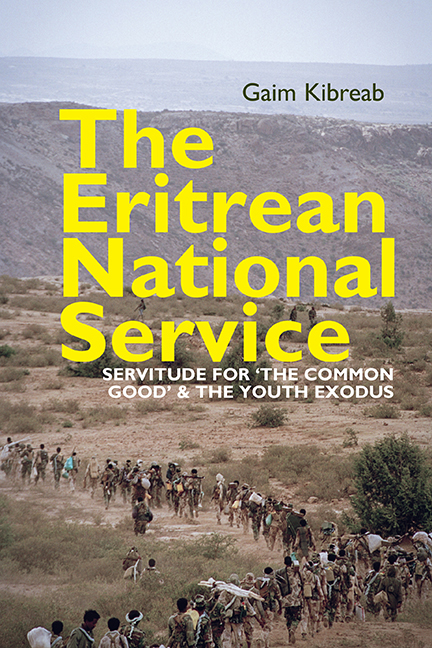Book contents
- Frontmatter
- Dedication
- Contents
- List of Figures and Tables
- Foreword
- Acknowledgements
- List of Acronyms & Abbreviations
- 1 Introduction
- 2 National/Military Service in Africa: Theories and Concepts
- 3 The Government and the Structure of the Eritrean Defence Force
- 4 The Nature of the Eritrean National Service and its Effectiveness as a Fighting Force
- 5 The Eritrean National Service as a Mechanism of Preserving and Transmitting the Core Values of the Liberation Struggle
- 6 The Eritrean National Service: A Vehicle for National Unity and Cohesion
- 7 The Eritrean National Service and Forced Equality
- 8 The Overarching Impact of the Eritrean National Service on the Social Fabric of Eritrean Society
- 9 Impact of the Open-Ended Eritrean National Service on Families and Conscripts
- 10 Conclusion
- Postscript: The UK Upper Tribunal (Immigration and Asylum Chamber) Country Guidance on Eritrea
- References
- Index
- Miscellaneous Endmatter
Postscript: The UK Upper Tribunal (Immigration and Asylum Chamber) Country Guidance on Eritrea
Published online by Cambridge University Press: 11 August 2017
- Frontmatter
- Dedication
- Contents
- List of Figures and Tables
- Foreword
- Acknowledgements
- List of Acronyms & Abbreviations
- 1 Introduction
- 2 National/Military Service in Africa: Theories and Concepts
- 3 The Government and the Structure of the Eritrean Defence Force
- 4 The Nature of the Eritrean National Service and its Effectiveness as a Fighting Force
- 5 The Eritrean National Service as a Mechanism of Preserving and Transmitting the Core Values of the Liberation Struggle
- 6 The Eritrean National Service: A Vehicle for National Unity and Cohesion
- 7 The Eritrean National Service and Forced Equality
- 8 The Overarching Impact of the Eritrean National Service on the Social Fabric of Eritrean Society
- 9 Impact of the Open-Ended Eritrean National Service on Families and Conscripts
- 10 Conclusion
- Postscript: The UK Upper Tribunal (Immigration and Asylum Chamber) Country Guidance on Eritrea
- References
- Index
- Miscellaneous Endmatter
Summary
Prior to the most recent Country Guidance on Eritrea, eightyseven per cent of those who were refused under the Home Office Country Information and Guidance, Eritrea: National (incl. Military) Service, August 2016 and Country Information Guidance Eritrea—Illegal Exit, September 2016, had their refusals overturned on appeal. In October 2016, the Upper Tribunal (Immigration and Asylum Chamber) in a country guidance case—MST and Others (national service – risk categories) Eritrea CG [2016] UKUT 00443 (IAC) rejected the much-criticised UK Home Office policy on Eritrean asylum-seekers by concluding:
Accordingly, a person whose asylum claim has not been found credible, but who is able to satisfy a decision-maker (i) that he or she left illegally, and (ii) that he or she is of or approaching draft age, is likely to be perceived on return as a draft evader or deserter from national service and as a result face a real risk of persecution or serious harm. (Para. 10) (Emphasis in original)
The UKHome Office Countryof Origin Information, whichinfluencesthe decisions of judges and case workers was based on the flawed assumption originating from the muchcriticised and discredited Danish Immigration Service report on Eritrea which concluded that if an Eritrean deserter from the ENS or draft evader who exited from the country illegally signed a repentance letter and paid the 2 per cent diaspora tax, he or she is free to return to Eritrea without facing any risk of persecution. The UK Upper Tribunal categorically rejected this flawed conclusion stating in para. 334:
Suffice to say for the purpose of this section, that we do not accept that the evidence goes anywhere close to establishing that the payment of the tax and the signing of the letter would enable draft evaders and deserters to reconcile with the Eritrean authorities. In relation to the letter of regret, we also have serious doubts that it can properly be described as a basis for reconciliation, since its terms amount to a confession of guilt by the person who signs it to what the Eritrean regime considers “appropriate punishment” in the context of a regime with a very poor human rights record.
- Type
- Chapter
- Information
- The Eritrean National ServiceServitude for 'the common good' and the Youth Exodus, pp. 191 - 192Publisher: Boydell & BrewerPrint publication year: 2017

